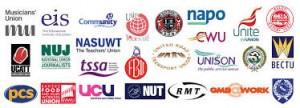It’s been open season on the working class since the Tories and Lib-Dems came to power. Cameron has carried on with assaults on the trade unions, our representatives, where Thatcher and Major left off. Not that Blair did much to redress the balance.
Capitalist employers are in business to maximise salaries/bonuses for themselves and returns for their shareholders. Labour is one of their highest costs and in every way possible they seek to keep those costs down by exploiting workers. The Tories consistently opposed the introduction of a statutory, minimum wage and warned that many businesses would close down. It didn’t happen, although globalisation has provided a golden opportunity for the exploitation of the poor overseas.
Trade unions hit the headlines in the media when there is strike action, a rare enough occurrence nowadays. The work of trade unions goes on daily, protecting the work force, securing safe and healthy conditions, equal pay, tackling poverty, the rights of female employees, maternity and paternity leave, pensions and the list goes on….
There are two sides to every dispute but our Press, including the national broadcaster, tend to focus predominately on the actions of the union with very little information given about the bosses. Two recent examples illustrate this.
The behaviour of Ineos, the owners of the Grangemouth petro-chemical plant is a clear cut example of capitalism at work. It shows little empathy with the work force through reaching agreed solutions with workers’ representatives. The suspension of the union convenor was a highly provocative, political act and when the workers withdrew their labour in protest, Ineos locked them out and threatened to close the plant and take their money elsewhere. Nowhere in the popular press did we find any condemnation of their behaviour but the trade union, Unite, was assailed on all sides, especially by the Tories. The workers succumbed to the bully boy tactics of the owners and have gone back with worse conditions and pensions threatened.
Boris Johnson, since his election as Mayor of London, has met with all sorts of commercial groups, including 86 delegations of bankers; he has consistently refused to meet with the trade unions. The Tube dispute last week was about the closure of every ticket office in the network – something which Johnson vowed would not happen when he was campaigning for the job. The right wing Press has concentrated its fire on Bob Crow, the RMT leader who, following a ballot of the workers, called a 48 hour strike. There is general agreement that the difficulties could easily have been resolved in discussion, if Johnson had been prepared to talk. The INEOS model suited him better politically, no matter what the upset was to commuters and he has vowed to return to Parliament to ‘sort the unions out’.
I hope that an Independent Scotland will permit the election of a Government here which values and respects the rights of workers through their trade unions.

Well said as always, John. I think images of Boris should be postered all over Scotland with the question “Do you want to live in the same country as this man?” Forget the White Paper – that should do it for the independence people.